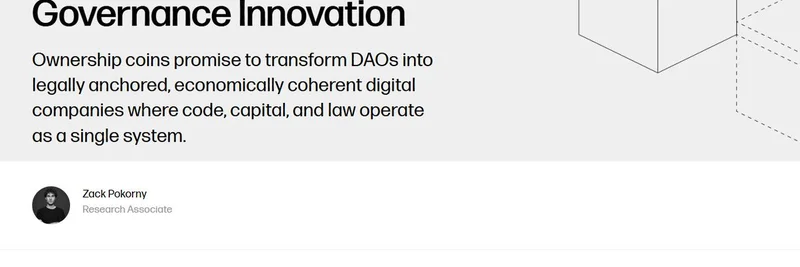A recent tweet from Zack Pokorny at Galaxy HQ has sparked excitement in the crypto community, highlighting a groundbreaking report on what could be the future of decentralized autonomous organizations (DAOs). Shared on X, the post introduces "ownership coins" as a game-changing innovation in internet capital markets and DAO governance. If you're into meme tokens or blockchain tech, this is worth paying attention to—it could transform how community-driven projects, including memes, operate and reward their holders.
Breaking Down the Traditional DAO Challenges
Let's start with the basics. Traditional DAOs often look decentralized on the surface, but dig deeper, and you'll find a split personality. There's the onchain part, where token holders vote on proposals using governance tokens. Then there's the offchain legal entity—like an LLC or foundation—that handles real-world stuff such as contracts, hiring, and holding assets. This setup raises money from VCs through equity, but token holders? They're left with influence that's more symbolic than substantial.
The problem? Token holders don't get real ownership or economic claims. If the project succeeds, the equity holders cash in, while tokens might pump on hype alone. If things go south—mismanagement or outright rugs—token holders have zero legal recourse. It's like investing in a company but only getting a say in the office decor, not the profits or decisions that matter. This disconnect has made many DAO tokens risky bets, decentralized in name only.
Introducing Ownership Coins: A Fresh Approach
Enter ownership coins, a concept pioneered by the team at MetaDAO and detailed in Galaxy's latest research report. These aren't your average governance tokens. They're designed to give holders actual control, economic rights, and protections—all baked into a fully onchain structure backed by legal enforceability.
At its core, an ownership coin ties everything together: the organization's assets, decisions, and value flows. Imagine a DAO where the token isn't just for voting—it's the key to directing the entire entity. All assets, from treasury funds to intellectual property, are held by a legal wrapper (like an LLC) that's legally bound to follow onchain governance decisions. No more rogue teams or disconnected equity; everything is transparent and enforceable.
This model flips the script on old-school DAOs by ensuring that token holders have a direct stake in the outcomes. Decisions aren't just voted on—they're tied to the organization's success, making governance more accountable and aligned.
The Power of Futarchy in Governance
What makes ownership coins tick? A big part is futarchy, a governance system that uses prediction markets to make smarter decisions. Coined by economist Robin Hanson, futarchy separates "what we want" from "how we get it." Communities vote on desired outcomes—like increasing token value or project growth—while markets bet on which proposals will achieve those goals.
In MetaDAO's setup, built on Solana, futarchy handles big-picture decisions: treasury spending, partnerships, or compensation. It's not for micromanaging daily ops; that's left to the team. But for strategic moves, markets provide a tamper-resistant way to gauge what's best, reducing the influence of whales or social cliques that plague traditional "one token, one vote" systems.
Think of it like this: Instead of opinions swaying votes, real money is on the line. Traders bet on conditional markets—if Proposal A passes, will the metric improve? The market price signals the winner, making decisions data-driven and less prone to manipulation. MetaDAO has already put this into action, creating a framework where token holders control a real entity without needing to be legal experts.
MetaDAO: Leading the Charge
MetaDAO isn't just theorizing; they're building it. Led by visionaries like Proph3t (as teased in the tweet), they've partnered with MetaLex to create a legal structure where an LLC owns everything but is slave to onchain futarchy decisions. Members of the LLC are legally obligated to execute what the markets decide—no offchain shenanigans.
This means ownership coins like MetaDAO's $META give holders enforceable control. Payouts, salaries, and distributions all go through transparent smart contracts. It's a step toward turning DAOs into legit digital companies, where code and law work hand-in-hand.
For meme token enthusiasts, this is intriguing. Many meme projects start as fun communities but struggle with sustainability. Applying ownership coin principles could evolve them into structured entities, where holders get real economic upside beyond pumps and dumps. Imagine a meme DAO that uses futarchy to decide on merch drops, partnerships, or treasury investments—aligning hype with actual value creation.
Why This Matters for Blockchain Practitioners
In a world where meme tokens often rely on virality and speculation, ownership coins offer a path to maturity. They address pain points like governance attacks (remember those vote-buying scandals?) and value leakage. By converging token value with the organization's real assets, they make investing in DAOs more like backing a startup—with rights and protections.
Of course, it's early days. Legal setups like this are innovative but untested at scale. Will regulators buy in? Can futarchy handle complex decisions without biases? Time will tell, but the buzz from crypto Twitter suggests this could be a pivotal shift.
If you're building or investing in meme tokens, keep an eye on MetaDAO and similar projects. Ownership coins might just be the tool to turn your favorite frog or dog token into a blockchain powerhouse. Dive into the full Galaxy report for more details, and join the conversation on X to see where this goes next.



